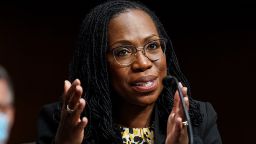Editor’s Note: Bakari Sellers is a former Democratic member of the South Carolina House of Representatives and a CNN commentator. He is the author of “My Vanishing Country” and “Who Are Your People?” and an attorney at Strom Law. The views expressed in this commentary are his own. View more opinion on CNN.
Do you realize that, of the nine justices sitting on the United States Supreme Court, none served a day as a state court judge? In fact, you’d have to go back to Justice Sandra Day O’Connor to find one who had.

But you know who has? US District Court Judge J. Michelle Childs.
You have to go back even further, to the legendary Justice Thurgood Marshall, to find a Supreme Court justice who went to a public university.
But you know who has? Childs.
In addition to her brilliant legal mind and steadfast dedication to fairness, which I have seen firsthand when representing clients in her courtroom, Childs is a judge without any air of pretension.
She is like so many Americans who have worked incredibly hard to achieve success in life. And isn’t it time we put someone on the bench who reflects our experiences?
The daughter of a police officer, who died when she was just a teenager, and a personnel manager for Bell Telephone, she’s faced the same adversity so many of us have. She graduated from Columbia High School in South Carolina, where today roughly 85% of students are Black and more than 88% of the students are living in poverty.
Childs attended the University of South Florida for her undergraduate studies and the University of South Carolina School of Law. She worked her way up through the ranks as an attorney, a Workers’ Compensation commissioner, a state judge and, in 2010, a judge on the United States District Court for the District of South Carolina, proving her worth every step of the way.
Of course, Childs could have entered the federal judiciary’s ivory tower years ago. She could have jumped from private practice like Justice Amy Coney Barrett or Chief Justice John Roberts. She could have leveraged a political pedigree like Justice Clarence Thomas or a job with the Department of Justice like Justice Neil Gorsuch.
But Childs is fundamentally different. She chose to dedicate herself to the practice of serving in the trenches – not just as a judge, but as a Black woman working with organizations like the Black Law Students Association, the South Carolina Bar Diversity Committee and more – reaching out to all those who face challenges and trying to elevate them.
I’ve seen it myself – in the middle of a South Carolina Gamecocks game. While she was cheering on coach Dawn Staley, I watched Childs, who I’ve become friendly with in recent years, excuse herself to answer a call from a young clerk or fellow attorney with a question. Whether it’s important or not, she always answers.
As one former clerk explained, “Judge Childs embodies what it means to ‘hold the ladder down.’” Indeed, while others talk about breaking down barriers and helping lift those who face the same obstacles to new opportunities, Childs actually does it.
Isn’t that what we want? Wouldn’t it be nice if one of the justices helping decide the constitutionality of state law had actually served on a state court? Wouldn’t it be something if we had a voice on the highest court who not only excels in abstract and theoretical legal discussion, which she does, but also has more of the practical and pragmatic experience that comes from looking the defendant in the eye and understanding the very real consequences of one’s judgment? (Currently, only Justice Sonia Sotomayor has been a federal trial-level judge.)
At a time when faith in our democratic institutions is being eroded by charges of tone-deafness and elitism, don’t we deserve a Supreme Court nominee who stands not above us, but among us? A nominee who can help reshape the image of the court as one dominated entirely by graduates of Ivy League universities into one that better reflects the diversity of the country’s educational experiences?
That’s why this remarkable Black woman educated in the Deep South finds herself praised by the likes of former President Barack Obama and Sen. Lindsey Graham of South Carolina. That’s why we need her on the Supreme Court.

